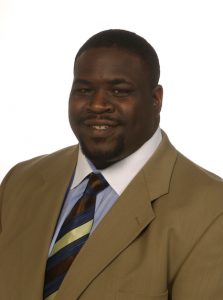
Elijah Sales
Rice University
Houston (29.7° N, 95.3° W)
featuring Illya Hicks, Professor of Computational and Applied Mathematics, Rice University, Houston (29.7° N, 95.3° W)
As talent and competition in various fields only seem to grow, it becomes easy for us to overlook the importance of  persistence. The path that Dr. Illya Hicks took to professorship at Rice University seems nothing short of challenging and eventful, yet his dedication to answering some of the most pressing questions in his field makes it ultimately rewarding. I had the honor of hearing a discussion from several years ago between Dr. Hicks and Nathan Andrus, former Rice University student. During this conversation, Dr. Hicks reveals factors that influenced him to delve into research and professorship in computational and applied mathematics, as well as insights into overcoming obstacles to attain leadership and achieve success.
persistence. The path that Dr. Illya Hicks took to professorship at Rice University seems nothing short of challenging and eventful, yet his dedication to answering some of the most pressing questions in his field makes it ultimately rewarding. I had the honor of hearing a discussion from several years ago between Dr. Hicks and Nathan Andrus, former Rice University student. During this conversation, Dr. Hicks reveals factors that influenced him to delve into research and professorship in computational and applied mathematics, as well as insights into overcoming obstacles to attain leadership and achieve success.
Dr. Hicks is a professor of computational and applied mathematics at Rice University, where he also performs research in this field. He graduated from Texas State University with a BS in Mathematics and subsequently pursued his graduate studies at Rice, where he obtained an MA and PhD in computational and applied mathematics. During his undergraduate years, Dr. Hicks took a class called “Deterministic Operations Research,” which influenced him to further explore computational and applied mathematics in greater depth. In fact, Dr. Hicks’s research interests span across various areas of the field, including combinatorial optimization, integer programming, matroid theory, and graph theory.
An interesting point that Dr. Hicks mentions regarding research, in general, is the intense competition involved, both with others and with himself. Not only is he motivated by the urge to prove or find something significant before anyone else, he is also driven by the need to exceed others’ expectations, as well as those of his own. Dr. Hicks reveals that as a child, he despised being “beaten” by a problem and not being able to solve that problem. As a graduate student at Rice, he felt that he “had to prove [himself],” and with this mindset, was able to succeed well beyond graduate school. One particular instance of success occurred when, after someone deemed a proof he submitted as incomplete, he was able to prove a conjecture on that proof from a different perspective. By breaking down these personal and external barriers, Dr. Hicks succeeded in proving mathematical concepts, and through the process prove himself, to others.
As someone who enjoys planning years into the future, I found that another crucial takeaway from this conversation is accepting the unpredictability of career paths. Dr. Hicks reveals that while he intended to pursue a career in industry with his PhD, meeting and working with Dr. Richard Tapia, also a professor of computational and applied mathematics at Rice, eventually influenced him to become a professor himself. He mentions a summer program that Dr. Tapia held in which students would not only conduct research but would also discuss professional and personal development. Through this program, Dr. Hicks became enticed with such development and now conducts a similar program for his own graduate students.
Dr. Hicks also emphasizes the significance of going the extra mile to achieve success and gain leadership in research. Although he believes that success is generally abstract, he attributes it to two characteristics: perseverance and creativity; without one or the other, it would be difficult for researchers to contribute original and meaningful ideas to any particular field. I found this insight to be an interesting connection to Dr. Hicks’s anecdote about proving a conjecture; because of his open-mindedness and persistence, he is able to contribute significantly through research. In terms of leadership, Dr. Hicks sees himself as a leader in discrete optimization at Rice and in the decomposition of broader problems from his research into smaller, more intricate parts. Aside from being a professor of computational and applied mathematics, he was also the Faculty Advisor to the President for the Department of Computational and Applied Mathematics at Rice. He has also served as President of the Minority Issues Forum of the Institute for Operations Research and the Management Sciences (INFORMS) at the time of this conversation, a role that has allowed him to help minorities succeed in their graduate studies and research.
The advice that Dr. Hicks provides about achieving greatness is extremely relevant to the ever-changing avenue of research. With the advent of innovative technologies and the surplus of impactful ideas, it becomes increasingly important to take a step back and truly “think outside the box.” Many ambitious students and researchers today dream about changing the world in some way, yet are hindered by the “fear of the unknown,” which Dr. Hicks believes is what prevents ideas from becoming reality and dreamers from becoming leaders. Getting rid of that fear is the first step to achieving greatness and making an impact. Employing perseverance and creativity is the next.
